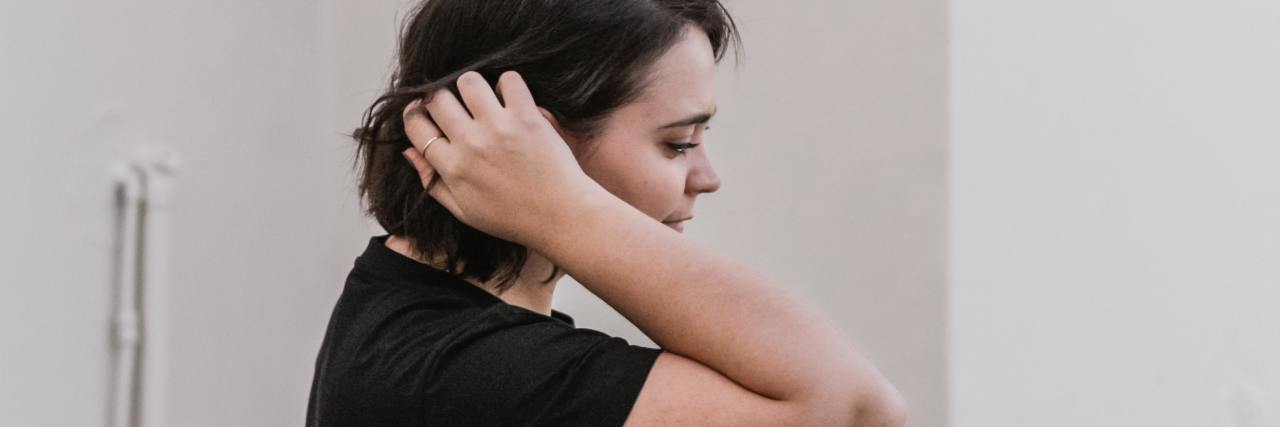My Eating Disorder Is Valid, Even If I’m Not Thin
Editor's Note
If you live with an eating disorder, the following post could be potentially triggering. You can contact the Crisis Text Line by texting “NEDA” to 741741.
National Eating Disorders Awareness (NEDA) Week is February 24 to March 1. The theme this year, “Come As You Are: Hindsight is 2020,” is a continuation of the 2019 theme, which sought to bring awareness to diversity in the eating disorder community.
Historically, people with eating disorders have been portrayed with a certain “look.” Typically, that’s a white, young, cisgender woman in an emaciated body. Stock photos of this woman depict her frowning while eating a plain salad or standing on a scale. While there certainly are people with eating disorders who fit this look, there are also plenty of other people with eating disorders who don’t.
I’ve always wanted to speak out about my eating disorder. When I was struggling, I could have used more support around me. Now I’m in a solid place in my recovery, I want to help other people find the same stability. Sometimes, I find myself still holding onto the idea that my eating disorder is less valid than the disorders of people in thin bodies, and it holds me back from speaking my truth. This week, however, I feel particularly inspired to talk about my journey.
I have never been considered “thin.” The last time I was in a “normal-sized” body was in kindergarten. I spent my entire childhood feeling ashamed of my body, wanting so badly to look more like my peers. As I grew up, I frequently went on diets with little results. In college, I took my dieting behaviors to the extreme, and before I knew it, I had developed a full-blown eating disorder.
I happened to be in therapy for my anxiety and depression when my eating disorder kicked into high gear. It took some time to work up the courage, but I eventually told my therapist about what had been happening outside her office. She called out my behavior for exactly what it was: bulimia nervosa.
To me, it didn’t matter that I fit the diagnostic criteria for bulimia perfectly. I denied the fact I had an eating disorder for several months because I still held onto that bogus stereotype of what someone with an eating disorder looks like. When I reflect on my recovery journey, I thank my lucky stars every time I remember how my therapist saw me. She saw my struggle. She saw my pain. It didn’t matter to her at all that I was in a larger body. She heard my story and gave me the correct diagnosis.
Unfortunately, I’ve heard horror stories from my fellow recovery warriors about their eating disorders being overlooked by health care providers. They were told that they weren’t “thin enough” to have an eating disorder. They were praised for their seemingly “healthy” behaviors. They were complimented for losing weight.
For me, I got the diagnosis, and over the course of my recovery, I’ve had a therapist and a dietitian who truly understand eating disorders. Outside those appointments, however, the people around me complimented my weight loss. They didn’t seem to notice my exhaustion or the way in which I isolated myself. Even after some of my friends and family members knew about my eating disorder, they continued to talk about “healthy” eating, exercise and dieting around me, invalidating my experience again and again.
Despite the ignorance and fatphobia that I experienced in my recovery journey, I did get better. It took several years, but every single day of recovered life is well worth the hard work. Now that I feel strong in my recovery, I can confidently say: Full recovery is possible.
To anyone out there supporting a loved one with an eating disorder, I hope you know how important you are to their recovery. Please continue learning and growing with your loved one. Examine your inner bias. Challenge stereotypes when you hear them. You are one of their greatest advocates.
To anyone out there struggling with an eating disorder, please know that your experience is valid, no matter your body size. You deserve full recovery. There is a professional out there who understands and can give you the help you need. Keep going. I believe in you.
No matter your size, gender identity, sexuality, race, ethnicity or age, you deserve to #ComeAsYouAre.
Follow this journey on the author’s blog.
Photo by Sincerely Media on Unsplash

